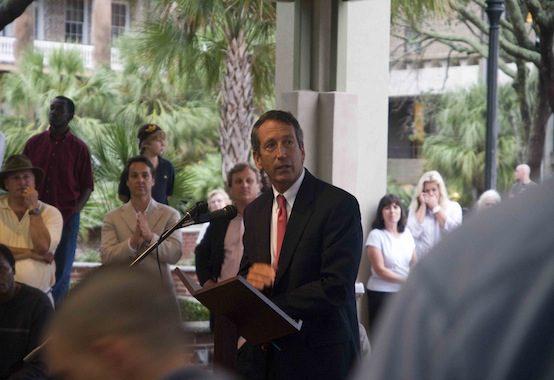Mark Sanford, Hypocrisy, and Spiting One’s Face

This blog post from Ross Douthat seems a bit unfair to the voters of South Carolina:
… the fact that South Carolina Republicans took that path, and made his swift and shameless comeback a success, is still a useful indicator of where the energy is on the right — and it emphatically isn’t with people who see the decline of marriage as a bigger issue for conservatism and America than the precise balance of power in the House of Representatives.
…or maybe the energy is just with people who care about the balance of power in the House of Representatives during elections for the House of Representatives.
From the moment he decided to run again Mark Sanford was always going to be taken as a demonstration of Republicans’ hypocrisy. After he won, Meghan McCain immediately took to twitter to say the voters of South Carolina have no moral standing to oppose gay marriage anymore. David Burge promptly reminded her that she wouldn’t exist without a politician’s infidelity. Moreover, though the two candidates’ marital sagas are not remotely comparable, Colbert-Busch did spend a night in jail for contempt of court during her divorce proceedings, so she’s not exactly unsullied either.
Hypocrisy is not hard come by in politics. I’d venture that many of the Republican voters in the first district of South Carolina do care about the decline of marriage, probably more than most. And the idea that voters should just stay home when faced with a bad choice seems at least unrealistic, if not undemocratic.
How would things have played out in a district full of the voters willing to forego representation to send a message about the state of marriage?
As Douthat wrote in a later post today: “a special election to fill out a term in a reliably-conservative seat seems like exactly the kind of high profile, low stakes contest where it makes sense to put moral and theological principle ahead of party.” That Sanford made such a high-profile attempt to reassert himself into politics, and that it garnered such media attention, would have made an inconsequential House election a good opportunity for good old American virtue to reassert itself and thwart everyone’s expectations.
It would have made a nice story, but to believe it was possible require a highly unrealistic view of political behavior and public memory. Sanford resigned as the chairman of the RGA little less than four years ago. By contrast Marion Barry was reelected to DC’s city council five months after being released from prison. Ted Kennedy was reelected with 62 percent of the vote a year and a half after killing someone. Did Michigan voters somehow lose their moral standing to oppose fraud when they elected Charles Diggs while he awaited sentencing for taking kickbacks?
I share some of Douthat’s concerns, but I don’t really understand this logic. The reassertion of virtue he seems to have in mind should have happened in the primary, if it was to happen at all. That voters failed to punish themselves for Mark Sanford’s sins in the general election is neither a surprise nor a disappointment.
Comments